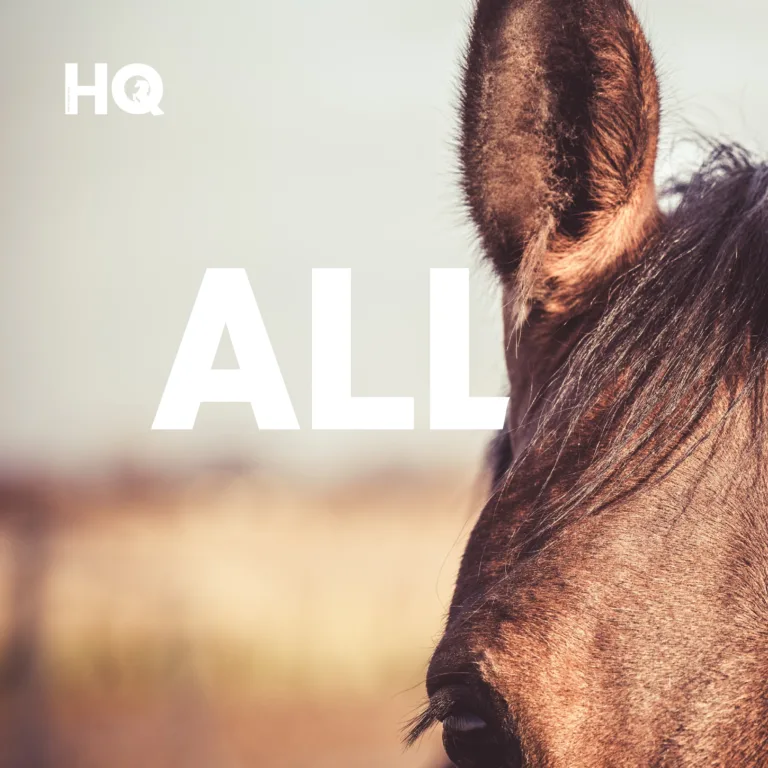Sound sensitivity in horses, often referred to as auditory hyperaesthesia, is a prevalent yet frequently overlooked issue that can have significant implications for a horse’s well-being. Whether it’s the distant rumble of thunder, the crackle of fireworks, or the everyday noises of the barn, some horses react more intensely to sound than others. Recognising, managing, and knowing when to seek professional help for sound sensitivity is crucial for any horse owner or caretaker.
Did you know?
Horses hear sounds over a wider range of frequencies than we do, although the decibel levels they respond to are about the same. This means that they can be aware of sounds outside our range of hearing but experience volume in a similar way.
Recognising sound sensitivity in horses
Horses are naturally alert animals with acute hearing, which makes them prone to noticing sounds that humans might overlook. However, when a horse is sound-sensitive, his reactions to auditory stimuli can become exaggerated and sometimes dangerous. Here are some common signs of sound sensitivity:
- Startling or spooking: One of the most obvious signs is when a horse suddenly jumps, bolts, or attempts to flee in response to unexpected or loud noises. This can be anything from a car backfiring to a sudden clap of thunder to a door slamming.
- Heightened anxiety: Horses may show signs of increased anxiety, such as becoming overly alert or sweating. They might pace in their stalls, become more reactive to other stimuli, or appear generally unsettled.
- Head shaking and ear movements: Constant ear flicking, head shaking, or pinning ears back can indicate that a horse is uncomfortable with certain sounds. These behaviours might become more pronounced when the horse is exposed to particular noises.
- Avoidance behaviours: A sound-sensitive horse may refuse to enter certain areas where it associates sounds with discomfort or fear. For example, a horse might be reluctant to enter a trailer if it associates the enclosed space with loud noises.
Did you know?
Not only are equine ears shaped to hear, but because of the musculature around the ears, the horse can rotate each ear independently as much as 180 degrees to pay attention to a sound without turning the head.
Managing sound sensitivity
Managing a horse with sound sensitivity requires a combination of environmental adjustments, training, and, sometimes, therapeutic interventions. Here’s a few ways to help your horse cope:
- Create a calm environment: Minimise exposure to sudden or loud noises in the horse’s environment. If possible, stable your horse in a quieter area of the barn, away from noisy machinery or high-traffic areas. If this is not possible, playing background music while your horse is stabled (and even while you ride) can help minimise the impact of environmental noise.
- Desensitisation training: Gradual exposure to the triggering sounds with positive reinforcement when the horse remains calm can help desensitise a horse to noises. Start with very low levels of the sound and gradually increase the volume as the horse becomes more comfortable. Each time the horse remains calm in the presence of a new noise or new level of noise, you should reward him with a treat or scratches to pair the noises with positive experiences. This process should be done slowly and over time to ensure the horse is not overwhelmed.
- Use of calming aids: There are various calming supplements, such as magnesium or tryptophan-based products, that can help reduce anxiety in sound-sensitive horses. Some owners also find success using calming essential oils or aromatherapy.
- Ear protection: In situations where you know your horse will be exposed to loud noises, such as during shows, fireworks displays or thunderstorms, consider using earplugs or noise-dampening bonnets. These can help reduce the intensity of the sound and make the horse feel more secure.
- Consistent routine: Horses thrive on routine, and maintaining a consistent schedule can help reduce anxiety. Knowing when to expect feeding, turnout, and work can make a sound-sensitive horse feel more secure.
A note on hearing loss
In addition to ageing, the disorders that affect equine hearing are temporohyoid osteoarthropathy (THO), congenital deafness (often related to coat colour), brain diseases, head trauma, and ear infections. Similar to horses with sound sensitivity, these horses with hearing loss may exhibit behavioural changes. These horses are likely to become more anxious due to the loss of the sense; in many cases, hearing loss is undetected or overlooked when looking for the cause of the anxiety.
When to seek professional help
While some horses can be managed effectively with the strategies above, others may require additional help. It’s important to know when to seek professional assistance:
- Persistent anxiety: If your horse remains highly anxious despite your best efforts to manage sound sensitivity, it may be time to consult with a vet or equine behaviourist.
- Dangerous behaviour: If your horse’s reactions to sounds are putting him, you, or others at risk, professional intervention is necessary. A behaviourist can assess the situation and develop a tailored management plan.
- Underlying health issues: In some cases, sound sensitivity can be a symptom of an underlying health problem, such as ear infections or neurological conditions. A vet can perform a thorough examination to rule out or address any medical issues. NOTE: If increased sensitivity to sound develops suddenly and was not present before, you should arrange an urgent vet appointment. Several conditions that can lead to sound sensitivity have a better prognosis if managed quickly.
Take home message
Sound sensitivity in horses is a manageable condition, but it requires patience, understanding, and sometimes professional help to deal with. By recognising the signs early and implementing appropriate management strategies, you can help your horse feel more secure and reduce the stress associated with sound sensitivity. Remember, every horse is unique, so what works for one may not work for another. The key is to stay attuned to your horse’s needs and be willing to adapt your approach as necessary.

